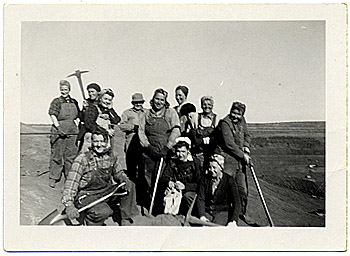 |
 |
| While the Men Were At War | ||
| part: 1 2 3 4 |
||
The only men she saw at the plant were either too young or too old to go to war, "but they were very nice to us women, very nice," she says. "T'aint like today. I can sympathize with these women in those other mines that had a lawsuit, and you hear so much now of harassment. But they were always nice to us." At least, most of them were. Travica remembers one man who would use his grease gun to squirt grease on the women. "He thought it was a great joke. So the women thought, 'We'll get even with him someday.' But every time they'd go to do something to him, he'd run to the men's bathroom -- they called it the 'dry' in those days." Inside the dry was a big round wash stand, like a giant bird bath. "And one day there was a whole bunch of women and we thought, 'We'll get even with him!' A man come out of the dry and said there's nobody in there, so it was okay for us to go in. So we grabbed him and took him and put him in that bird bath, turned the water on him, and he never played no more jokes!" In the photo of the day shift at the Danube mine, the women are all wearing overalls, heavy jackets, and steel-toed boots. Travica says in those days women usually wore dresses. But in the mine they had to dress like men. Travica is wearing a sturdy wool jacket left by her younger brother when he was killed in the war. Three of the women in the picture are sisters. Mary Jokinen is dead now, but her sisters Millie Mandich and Zorey Rukavina have lots of memories of the mine. Millie Mandich had been working as a cook, but when the call went out for women to work at the mines, she jumped at the chance to earn more money. "In those days we didn't have enough money; you had to get out and earn some," she says. Her brother's wife took care of her four young children while she worked at the Danube mine. Night shifts were the hardest. "I'd take care of the kids all day, sleep a couple of hours, and then get up and do my work," Mandich says. |
||
| Next: part 3 |
